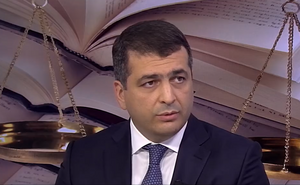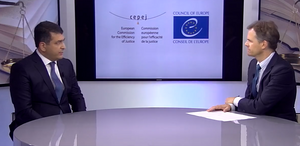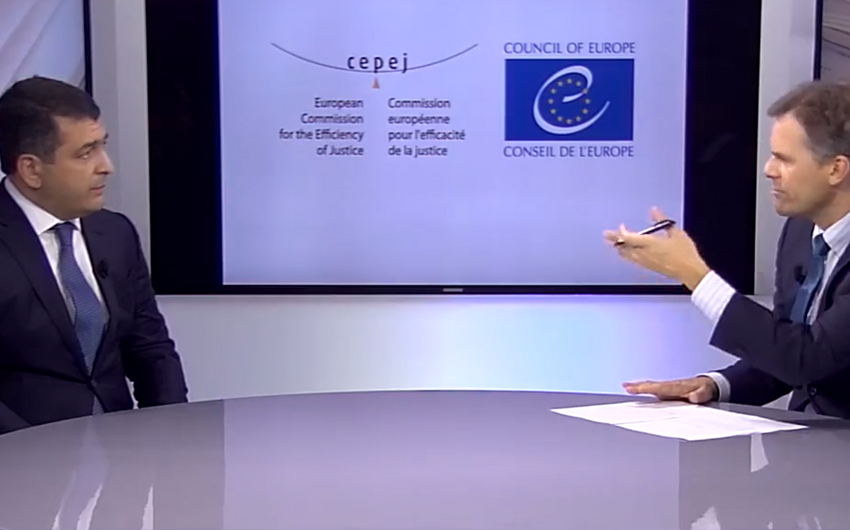Baku. 8 December. REPORT.AZ/ Report News Agency presents an interview of new elected Vice-President of the European Commission for the Efficiency of Justice (CEPEJ) of Council of Europe Ramin Gurbanov to the Council of Europe's media about the European courts:
Reference: R. Gurbanov worked as Vice-President of CEPEJ from July 1 in 6-month period and Member States of the Commission elected him to this post for next two years. CEPEJ was established as an analytical and advisory institution of the Council of Europe and specialize in promoting justice in Europe and assistance to the member states increasing and improving justice system.
Ramin Gurbanov was born in 1974. He graduated from the Faculty of International Law of Baku State University. He has been working in Defense, Justice, NASA and other institutions as legal advisor, researcher, teacher, presenter and chief specialist. From 2005 is a member and national correspondent of the CEPEJ, from 2011 is a member of the Working Group on evaluation of judicial systems (CEPEJ-GT-EVAL) and in 2014-2015 participated in the peer evaluation trips to Estonia, Switzerland, Lithuania and Slovakia. In 2014 he was elected as a member of the CEPEJ Bureau. In 2016, he was elected Vice-President of the CEPEJ. He has been working as a judge of Baku Yasamal District Court since 2013.
- What does the commission do?
- Almost decade ago the commission was established and this demonstrated the will of Council of Europe to promote rule of law and fundamental rights in Europe based on European convention on human rights. Taking into account excessive workload of the European Court of Human Rights , CEPEJ was established as an analytical and advisory institution of the Council of Europe and specialize in promoting justice in Europe and assistance to the member states increasing and improving justice system.
- What does improvement of justice system means?
- It means that all steps were taken to speed up justice in member states to increase their efficiency in order to decrease workload of the European court and i would like to say that today the commission gained very high respect among the policy makers, lawyers, judges, justice employees and during the recent 15 years there were developed many documents and tools within the CEPEJ and justice field. This documents considered very useful not only in the efficiency and quality of justice in general but also in particular matters of judiciary.
- When we talk about improving justice systems we talking about the way judges organize their working time, is it that king of things?
- Of course, CEPEJ comprising the main five fields of activities. They are evaluation of judiciary systems, here is how judges record system organized, how judges organize their work
- Report is organized every year...
- Yes, every two years we organize this report and recently in Paris it was a press conference and new report covering 2014 data was released to the European Community and other directions comprising identifying the quality issues, quality of justice the judiciary time frames, implementation of the alternative dispute resolutions and also enforcement of court decisions
- You come from Azerbaijan yourself and CEPEJ work quite close with your authorities there i believe on the judiciary reforms in Azerbaijan. Can you tell us bit more about that ?
- Before turning to Azerbaijan i would like to say that in CEPEJ in parallel with developing all this tools and documents we are also very closely working with member states within their targeted cooperation projects and cooperation programs.
- So in one hand you have got request from member states for assistance and then you have got projects...
- You are right, in recent period 12 projects successfully implemented in such countries like Azerbaijan, Croatia, Portugal, France and etc. When we talk about more broad cooperation projects now we are running about 10 projects and these projects are covering not only the Europe but also some countries outside the Europe like Jordan, Tunisia, Morocco and other countries. Relating to Azerbaijani i would like to say that Azerbaijan is a very active member of the Council of Europe and the Azerbaijani authorities expressed very strong political view to bring judiciary in accordance with the international standards and standards of the Council of Europe. The largest judiciary reforms have been successfully implemented during the recent years and these works have been done with close collaboration with Council of Europe and i would like to stress out that recent reforms was based on information sources gathered by CEPEJ. For example, when policy makers make decision on number of judges, number of courts, type of courts, number of lawyers and prosecutors also in identifying the key performance indicators in court performance in application of IT technologies. We always refer to the Council of Europe, European Commission for the Efficiency of Justice and today we recommend strongly to other counterparts also to benefit from this report from information and methodology developed by CEPEJ.
- So a lot is happened, a lot is been done already but i believe there still some work going on?
-Of course, none of the countries can say they already reached goals in developing justice system, life is going on, new challenges are coming and Council of Europe and European Union run two projects in Azerbaijan. First covered years of 2012-2014. It was the project on enhancing judicial reform in Eastern Partnership countries. At the moment the project called Eastern Partnership Programmatic Cooperation Framework (PCF) covering 2015-2017 years. The main idea of this project is to strengthen independence of judiciary by means of increasing the efficiency of court, their role in delivering user oriented justice, increasing the quality of training of judges and promoting self governance in Azerbaijan and also continuing reforms in line with standards of Council of Europe.
- When you talk about user oriented justice what does that mean?
- It means that all the justice served for citizens, this is the main idea. By increasing the efficiency inside the justice, inside the courts our aim is to deliver the proper speedy justice to citizens across the Europe. In Azerbaijan this project started to implement in 5 pilot courts. We chose pilot courts where we have already keys management system and the old styled courts to see how CEPEJ tools and methodology can be used in modern courts, smart courts and old styled courts. We found out that this methodology and these tools and documents gave positive outcomes and today judiciary services relating to the quality and efficiency are given very good outcomes in these courts and other national courts across the country in Azerbaijan also raised interest in implementing the same tools in these courts.
- 5 pilot courts are at what level?
- The first instance and appeal courts. We chose two courts from appeal and the rest first instance but also by specialization. We have the common jurisdiction courts and also the administrative economic courts.
- When you talk about "Smart" courts what does that means?
- We are also now establishing "Smart" courts because now the main idea of speeding up the processes of making transparency for citizens is establishing "Smart" courts. "Smart" courts means wisely implementing IT technologies in the courts. Because there are many countries which implemented IT technologies, spend lots of investments but didn't achieve their goals. That's why we try to wisely implement proper key performance indicators and to develop dashboard for presidents of courts, for judges, for other higher courts in order to bring statistical data into knowledge
- So to let them know what is going on in their court
- Yes this is most important. And also to give e-Services for citizens. Because today what is a lack is a lack of time and we are trying to deliver the proper quality services to citizens through e applications
- Cyber justice?
- Yes, also it will be conference on cyber justice within the CEPEJ and within the Council of Europe in Council of Europe to discuss future of IT applications and what we can expect from that in the future.




 https://static.report.az/photo/848d81bf-42c5-4439-920a-46e3d7ff6a0b.jpg
https://static.report.az/photo/848d81bf-42c5-4439-920a-46e3d7ff6a0b.jpg

